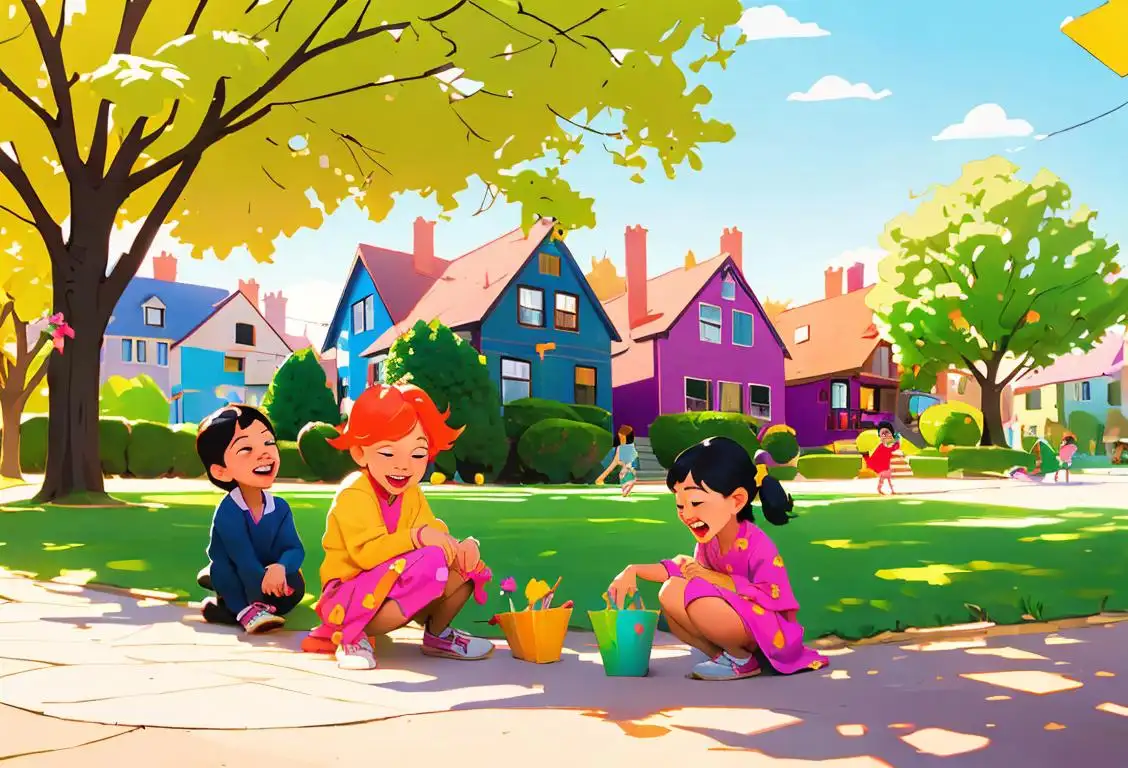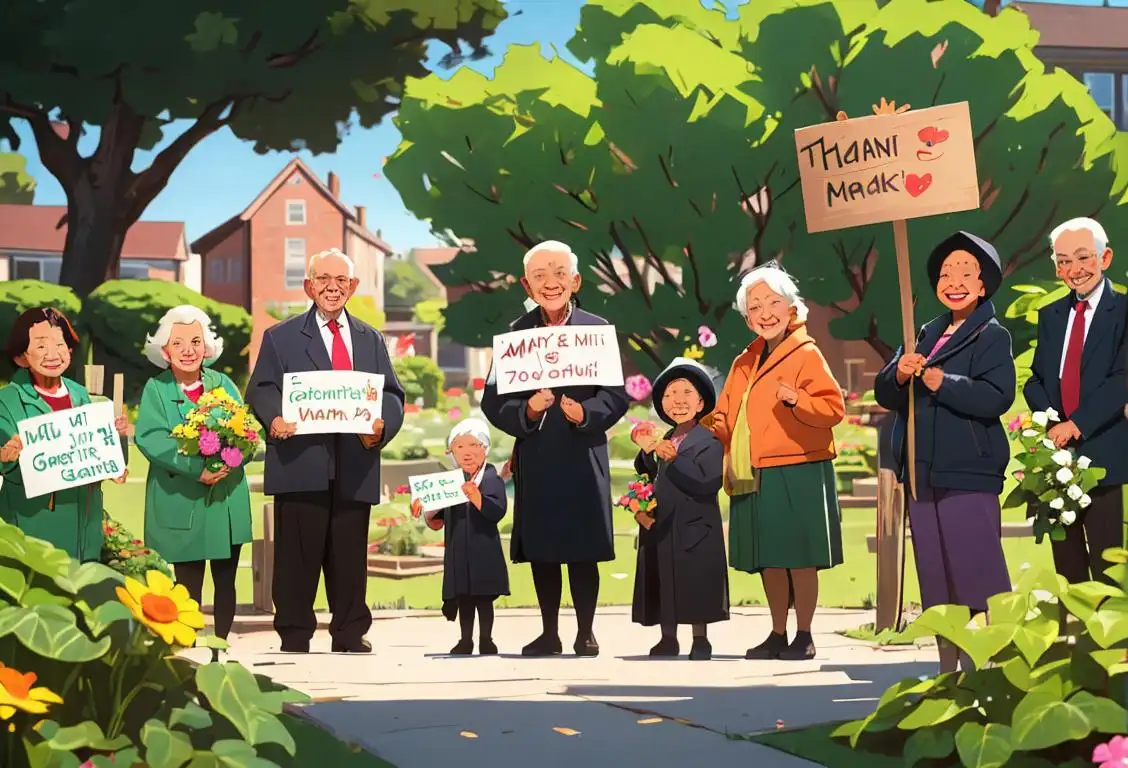National Neighbor Day

Hey there, neighbor! Today we're celebrating National Neighbor Day. It's the perfect opportunity to reach out to the folks next door, show some love, and maybe even borrow a cup of sugar (if that's still a thing). So let's dive into the online buzz and uncover the fascinating history of this day!
When is Neighbor Day?
It's national neighbor day on the 28th September.
The Birth of National Neighbor Day
Picture this: it's a peaceful neighborhood with neatly trimmed lawns, white picket fences, and the sound of friendly banter echoing through the streets. But where did this delightful day originate? Well, the internet history of National Neighbor Day isn't as clear as your neighbor's always-pristine garden.
While we couldn't uncover a specific online record of the first Neighbor Day celebration, one thing is for sure: the concept of being a good neighbor has been around for centuries. From village communities to city blocks, people have always understood the value of building connections with those who live nearby.
Although we can't credit the internet for inventing National Neighbor Day, it has certainly played a role in spreading the word and encouraging neighbors to come together. Online communities, social media channels, and neighborhood forums have all contributed to the growth and celebration of this heartwarming day.
Neighborly Gestures and Fun Activities
Now that we know a bit about the history, let's talk about what you can do to celebrate National Neighbor Day. It's all about fostering a sense of community and making those around you feel special. Here are a few neighborly gestures to consider:
- Organize a block party: Fire up your grill, set up some tables, and throw a good old-fashioned neighborhood cookout. Who knows, maybe you'll discover a hidden talent for sizzling burgers!
- Give a helping hand: Offer to mow your neighbor's lawn, walk their dog, or lend a hand with a household chore. A little act of kindness can go a long way and make someone's day brighter.
- Start a neighborhood project: Gather your neighbors and embark on a community project, like planting trees in a nearby park or creating a communal garden. Uniting for a common cause strengthens the bond between residents and creates a stronger sense of belonging.
- Host a movie night: Set up a big screen in your backyard, grab some popcorn, and invite your neighbors over for a cozy movie night under the stars. It's a great way to relax and enjoy each other's company.
Did You Know?
Did you know that Mister Rogers, the iconic TV host known for his kindness and neighborly spirit, dedicated an entire week to celebrate neighbors? It was called the National Good Neighbor Day, and it was all about spreading love, understanding, and compassion. After all, who better to learn about being a good neighbor than Mister Rogers himself?
History behind the term 'Neighbor'
Old English period (5th-11th century)
Origins in Old English
The term 'neighbor' finds its origins in Old English, where it was referred to as 'neahgebūr'. The word 'neah' meant 'near' or 'close', while 'gebūr' denoted 'dweller' or 'inhabitant'. It carried the meaning of someone who lived nearby, emphasizing the physical proximity of individuals.
Old English Period (5th - 11th centuries)
The Word: Neahgebur
The term 'neighbor' has its origins in Old English, a period lasting from the 5th to the 11th centuries. The Old English word 'neahgebur' served as the predecessor to the modern term. 'Neahgebur' combined the words 'neah,' meaning 'near,' and 'gebur,' meaning 'dweller' or 'inhabitant.' This compound term referred to someone who lived nearby or near-dweller.
Middle English Period (11th - 15th centuries)
Nebur or Neighbor
During the Middle English period, which spanned from the 11th to the 15th centuries, the term 'neighbor' underwent some changes. It transitioned from 'neighbor' to 'neighbo(u)r.' This alteration reflected the linguistic shifts occurring in the English language during that time. The term 'neighbo(u)r' retained its meaning of someone who lived nearby.
Middle English period (11th-15th century)
Evolution and Middle English Usage
During the Middle English period, the term 'neighbor' underwent some changes. It evolved from 'neahgebūr' to 'neighbo(u)r', influenced by the Norman French term 'voisin'. This adaptation showcased the linguistic influence and cultural exchange between the Anglo-Saxons (Old English speakers) and the Norman conquerors. The term still retained its original meaning of residents living nearby.
16th-century Europe
Neighborly Relations in Early Modern Europe
In early modern Europe, the concept of neighborly relations expanded beyond just physical proximity. During the Protestant Reformation, religious conflicts led to heightened divisions among different Christian sects. However, the idea of being a good neighbor took on an important role in promoting peaceful coexistence and tolerance. This led to the recognition of the term 'neighbor' as someone who extends kindness, support, and cooperation to others, regardless of religious differences.
Modern English Period (16th century - present)
Standardization of 'Neighbor'
In the Modern English period, starting from the 16th century, 'neighbor' became the standardized form of the term. With the establishment of standard English, the spelling 'neighbor' prevailed over alternative variants like 'neighbo(u)r.' It solidified its position as the accepted and widely used term for someone who lives near or nearby.
American Usage and Cultural Impact
American Appreciation of Neighbors
In American society, the notion of being a 'good neighbor' became deeply ingrained. The importance of community and neighborly relationships is exemplified by the famous proverb, 'Love thy neighbor as thyself.' This phrase became a guiding principle for promoting harmony, unity, and consideration for others within communities. The cultural impact of the term 'neighbor' in American society emphasized the value of social connection, support, and collective responsibility.
Did you know?
Did you know that Mister Rogers dedicated an entire week to celebrating neighbors?Tagged
fun loved ones communityFirst identified
29th May 2015Most mentioned on
28th September 2020Total mentions
326Other days
Neighborhood Day
Unity Unity Day
Texas Day
Neighbor Day
Thank A Resident Day
Go Caroling Day
Cheese Pizza Day
First Responders Day
Scavenger Hunt Day
Car Wash Day








